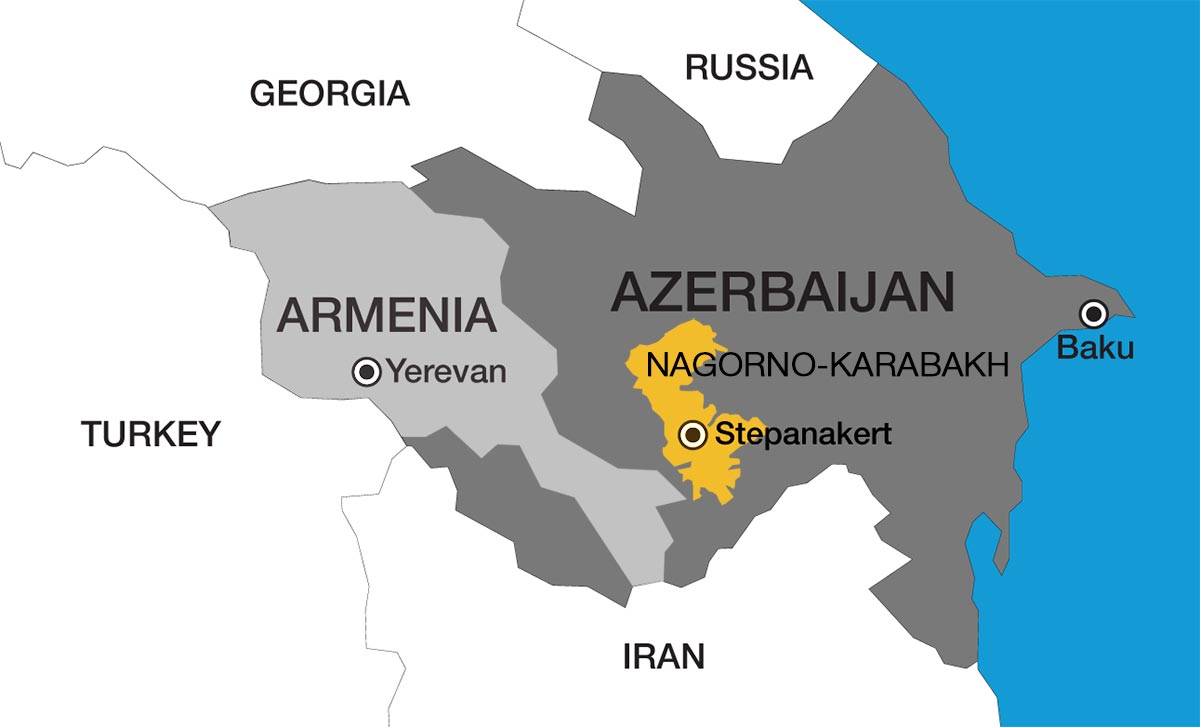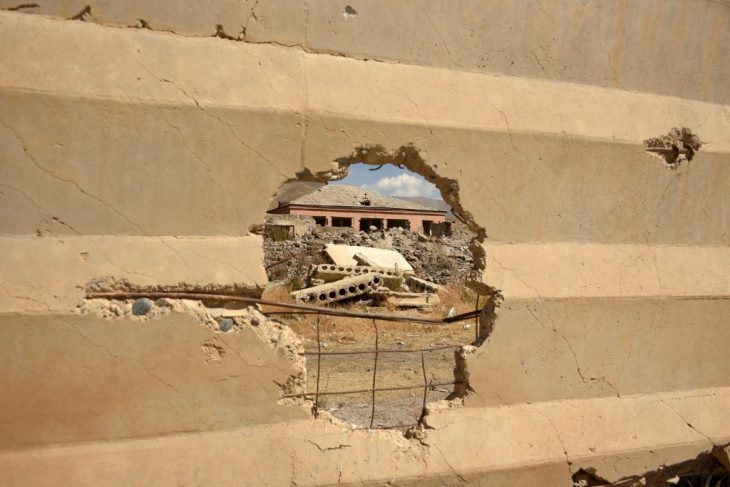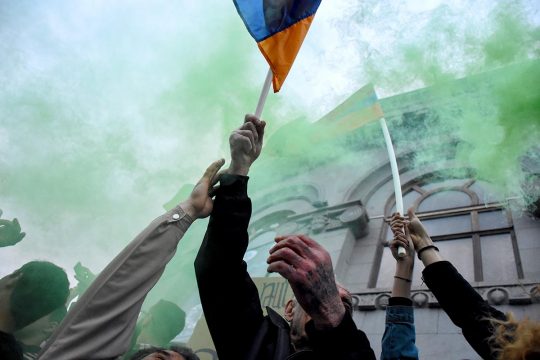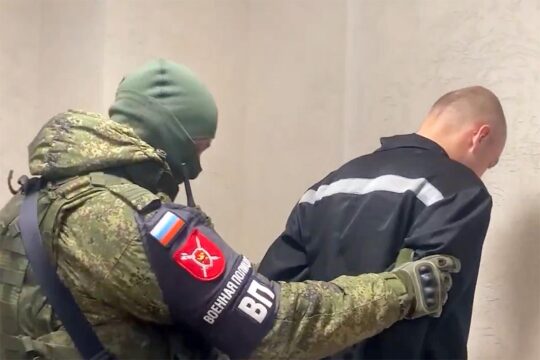On the night of September 12-13, violent clashes erupted along the eastern and southeastern border between Armenia and Azerbaijan. The hostilities, which had been brewing since a ceasefire agreement signed under the auspices of Russia two years before, continued until September 15. Over these 48 hours, Azerbaijani forces reportedly used heavy artillery and drones along a 200 km stretch of the border. According to the Armenian prime minister, the shelling deliberately targeted the civilian population and vital civilian infrastructures in 36 residential areas and communities.
The direct cause that re-sparked hostilities remains unclear, with Armenia and Azerbaijan blaming each other. The Armenian prime minister referred to the Azerbaijani shelling as an unprovoked and unjustified military aggression. Azerbaijan claims its attack came as a response to “large-scale provocations” from Armenian forces. What is clear is that, as a consequence of the fighting, thousands of civilians were evacuated from towns and villages and at least 207 Armenian and 80 Azerbaijani soldiers were killed, making it the deadliest attack since September 2020.
A predictable escalation
Whilst skirmishes are recurrent between the two countries, they are usually concentrated around the disputed enclave of Nagorno Karabakh. The origin of the tensions is complex, with links to the dissolution of the Ottoman and Russian empires, the Armenian genocide, the Bolshevik revolution leading ultimately to the decision of Stalin in 1923 to give the Nagorno-Karabakh enclave, previously attributed to Armenia, to Azerbaijan.
The enclave has been a constant and growing issue since the independence of Armenia and Azerbaijan from the disintegrating Soviet Union in 1991. Internationally recognised as part of Azerbaijan, it was populated and controlled by ethnic Armenians until 2020, where a full-scale conflict broke out over the control of the region, killing an estimated 6,000 people and displacing an estimated 91.000 individuals, mostly ethnic Armenians.
The 2020 conflict left the Armenian forces devastated by the 40 days of fighting and ended with an agreement between Azeri President Aliyev and Armenian Prime Minister Pashinyan agreeing to a ceasefire brokered by Russia. The agreement required Armenia to relinquish its military control over Nagorno-Karabakh, allowed Russian peacekeepers to guard the region for five years and guaranteed that Armenia would agree to provide a “corridor” in the south connecting mainland Azerbaijan to its exclave Nakhichevan.
Now, after two years of escalated tensions punctuated by regular clashes, and – according to Azerbaijan - Armenia consistently refusing to comply with the Russian-backed truce, it looks like Azerbaijan has grown tired of the situation, particularly the diplomatic standstill that prevents Azeris from gaining access to Nakhichevan and other alleged Armenian provocations. Indeed, whilst the previous fighting had been limited to the disputed Nagorno-Karabakh enclave, Azerbaijani forces moved deep into Armenia this time.
The situation in Nagorno-Karabakh in 2021

The shock wave of the Ukraine conflict
Taking a cue from its distracted Russian neighbour, Azerbaijan has clearly chosen to resort to violence to overcome Armenian resistance and get what it wants: the routes to Nakhichevan. The war in Ukraine places Azerbaijan in an unprecedently favourable geopolitical situation. With Russian gas supplies to Europe suspended, the European Union has turned to Azerbaijan for its energy supplies, giving the Azeris an advantage in the economic balance of power.
The timing of the Azeri attack - shortly after the Ukrainian counteroffensive around Kharkiv – indicates that Azerbaijan knows very well Russia is too distracted to keep the peace through its military presence in the Caucasus. Russia cannot afford any further escalation of violence. This could lead to drawing Turkey – a regional power and strong ally of Azerbaijan – into a wider conflict that would give it decisive influence in the sub-region against the Russian competitor.
Powerless victims
In addition to Armenia, geopolitically cornered by a weakened Russian ally facing a powerful Turkish-Azeri coalition reinforced by European Union needs, the real victims of the conflict are the thousands of displaced people who have lost everything. Where can they turn for protection or reparations for their suffering? With its human rights defender (Ombudsman), Armenia has a national mechanism that provides a platform for victims' voices. However, the Ombudsman’s powers are limited to those of an observer and reporter on violations of human rights and fundamental freedoms. While he is also responsible for facilitating the restoration of violated rights and freedoms, his mandate is far from sufficient to ensure the protection of victims, let alone the need for reparations.
A number of cases have been brought before the European Court of Human Rights against Armenia and Azerbaijan, with decisions establishing shared responsibility for the most serious violations, but the role and power of the Council of Europe in implementing or enforcing these decisions remains unclear. The International Court of Justice (ICJ) was also seized by Armenia and Azerbaijan in 2021 in connection with the implementation of the International Convention on the Elimination of All Forms of Racial Discrimination. On September 19, 2022, Armenia requested the ICJ to issue new provisional measures to "protect from violence and bodily harm all persons captured in connection with the 2020 conflict, or any armed conflict between the parties since that date, upon their capture or thereafter, including those who remain in detention, and to ensure their safety and equality before the law".
Rule of law versus law of the strongest
The present and past conflicts, in Ukraine or in the Caucasus, highlight the insufficiencies of the existing judicial or quasi-judicial mechanisms, which lack the necessary reactivity and efficiency to bring a satisfactory response to these tragic crises. Two radically different concepts of civilization confront each other here: the rule of law and the law of the strongest. This distressing alternative is currently expressed most clearly and most violently in Ukraine. Ukrainians perfectly understand what’s at stake: from the very first weeks of the Russian invasion, they have deployed a remarkable judicial strategy, appealing to all competent national and international jurisdictions, and even for the creation of a new special tribunal to try the crime of aggression.
The creation of a Standing Independent Investigation Mechanism (SIIM), as proposed by the International Commission of Jurists, could be a useful interim solution for victims of conflicts such as the one between Azerbaijan and Armenia. The SIIM would have two functions: to conduct investigations to gather information and evidence that could be used in criminal and other legal and administrative proceedings; and to provide a specialized service to any existing or future UN body aimed at holding accountable those responsible for atrocities. Regardless of the mechanism – an aggression tribunal, a standing investigative body, or some other appropriate solution – political initiative must be resumed, on a collective scale, to discuss and offer solutions based on the rule of law rather than the law of the strongest – so that the victims of the Armenian-Azerbaijani conflict do not get lost and forgotten in another impasse of international justice.
 MAUD SARLIÈVE
MAUD SARLIÈVE
Maud Sarliève is a lawyer and lecturer at the University of Paris-Ouest-Nanterre. She worked for the ECCC Office of Investigating Judges in Cambodia, for the EULEX Special Prosecutors in Kosovo and for a Defence team at the Special Tribunal for Lebanon.







